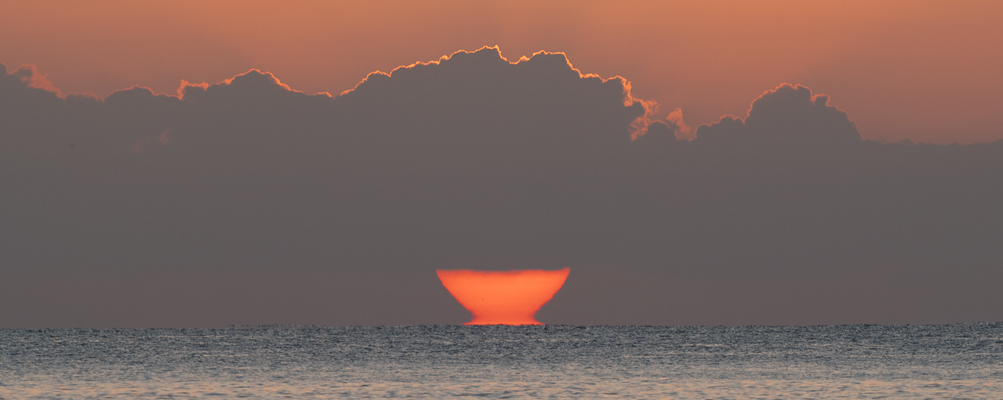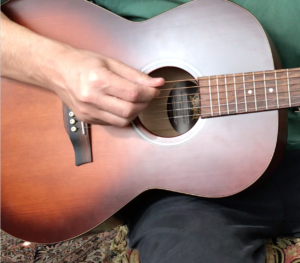Spoiler alert: this is not a post about obscene bluegrass songs. I don’t know if there are any, and I’m not even going to perform a search to find out. No, this is about me and the guitar. I’ve been (re)learning the guitar1
for a few months now, and I’ve found it to be a very stimulating experience. I’ve learned a few songs from a Christmas songbook, and I’ve rediscovered some of the classic American songlore—bluegrass songs like Arkansas Traveler, Saint Anne’s Reel, and the 8th of January. That last isn’t well known by that name, but its melody might be familiar to those of you of a certain generation under the title “Battle of New Orleans,” made famous by Johnny Horton: “In 1814 we took a little trip / Along with Colonel Jackson down the mighty Mississip.’ ”
It’s a fun little song, and like most bluegrass music, the arrangement I’ve learned has two simple parts, each repeated: A A B B. Very easy to learn, and very easy to improvise off once you’ve learned the parts. I learned it in C, but it’s easy to play as a fiddle tune (hint hint, Randy!) in D with a capo on the second fret.
What’s even more interesting to me than the process of reacquiring some music skill is that through learning this song, and relistening to Horton’s version of it from 1959 and paying attention to what’s going on in the light comedic verse attached to it, I independently rediscovered one of the axes around which one can consider the ongoing culture wars here in the United States to revolve: obscenity and control.
According to my extensive research (I googled the song and skimmed two whole Wikipedia articles), James Corbitt Morris, aka Jimmy Driftwood, wrote the song and packed it full of historical references and, if one believes what one reads, mild expletives. (He was a high school teacher and principal in Arkansas, and he turned to writing songs and lyrics to try to get his students interested in learning anything at all about history. His lyrics, as opposed to those of Horton, have many historical references: the push on the part of the soldiers to get Jackson elected president, a pirate named Jean Lafayette, the actual name of the leader of the British forces in New Orleans, etc.) One assumes that part of the reason his history students enjoyed the song was that they got the mild frisson of uttering forbidden words in school.
Johnny Horton’s version of the song, though, expunges even the mild expletives and achieved tremendous success. The closest Horton comes to a cuss is when he “rhymes” “well” and “well”:
We held our fire
…
‘Till we see’d their faces well
Then we opened up our squirrel guns
And really gave ’em—well we
Fired our guns and the British kept a-comin’
You see, back in the 1950s, and for a long time before that, one simply couldn’t utter words like “hell” and “dam” in an uncontrolled setting. There might be people who would hear them, be intrigued by their ideas, and wish to subscribe to their newsletters. As Tom Simon writes on his web page about the song, such words “were not heard on radio stations in the 50’s,” so radio stations would only play Driftwood’s version late at night. Johnny Horton heard the song one night at 2 a.m. as he was driving home from a gig and, after a struggle with his record label, finally succeeded in recording it.
It became one of the most popular songs of 1959, and it’s still popular today.
Horton’s song was recorded by Chet Atkins’s record label, RCA, but only after he scrubbed the song of all those cuss words that a high school principal and teacher decided were fit for high school students to hear. That simply doesn’t compute in a post -1968 world, where obscenity standards have relaxed to the point where there are only 7 seven words (according to George Carlin) that you can’t say on broadcast television.
It got me thinking. Perhaps the reason obscenity laws exist in a society is so that society can enforce a particular cultural construct. (What counts as obscene in one culture might be considered perfectly appropriate public behavior in another; modern obscenity laws in the U.S. seem to be abandoning the whole “swear word” mentality and converging on the truly horrifying acts such as depictions of child pornography and the like.)
As artists and cultural rebels have pushed back against this obscenity laws, society seems to have fractured into those who want to enforce these rules and those who want to abandon them. There are all kinds of groups one can assign to one camp or the other, but it seems to all boil down to those who favor control and those who don’t. (This is, of course, a gross simplification into neat binary opposites, which start to disintegrate the more closely one investigates them.)
Obscenity without a prohibition against it is meaningless. (What does it matter if one shouts “hell” and no one cares?) But for one camp, obscenity in and of itself is so full of meaning that it must be prohibited. For the other, prohibition itself is obscene.
Both camps claim that their approach to control (strict or laissez-faire might be a good way to categorize them) is the right way to allow for individual freedom within a society. Advocates of strict forms of control claim that there is no meaningful freedom without a framework in which that freedom can manifest itself. (How can one ignore the constraints under which one makes a choice? Art is art precisely because it voluntarily submits to such constraints, acknowledging them while at the same time working within them to overcome them. By this logic, poets have limitless freedom of expression within some very confining forms, such as the sonnet or the haiku. Those poets who can’t succeed within these frameworks simply lack true creativity.)
Opponents of such control, those who practice a laissez-faire approach to control, argue that the very existence of these constraints inherently limits one’s freedom to choose, and are therefore abhorrent. Art, particularly great art, tends to subvert the constraints or limits of the genre, to the point where they become meaningless. (Poets don’t write in sonnet form very much anymore, not because they lack poetic talent or creativity but—perhaps—because the artificial constraints of the form itself call to mind the real constraints of the society under which it flourished. A case can be made that the greatest artists both practice within AND subvert the constraints of their medium, while lesser artists focus on subversion.)
Getting back to the Battle of New Orleans, it occurred as part of the War of 1812, a conflict between an ancient country exerting strict forms of control and the new one that emerged from its former colonies that objected to that control. (Authoritarianism, taxation without representation, etc.) So it’s somewhat ironic that the type of control exerted in that rebel nation 150 years later still existed then, and that there are nostalgic leanings toward it still today.
I find it interesting that this type of nostalgia these days manifests itself (for some) in a glorification of the South’s cause against the brutal injustice of the North; for others, it’s a claim that bluegrass (or whatever genre you prefer) is the “true” American music (as if jazz or the blues can’t make that same claim; tellingly, both jazz and the blues have a deep history of strong black practitioners; bluegrass much less so, although this Reddit thread lists some with whom I need to acquaint myself: Nick Nicholson, Richard S Brown, Greg Donlan, Blake Atkins, etc.).
For example, another song I listened to on the bluegrass station I’ve been favoring recently is Burning Georgia Down. It’s about Sherman’s scorched-earth march from Atlanta to Savannah, one of the truly horrific acts of the Civil War, justified, and justifiable, only in purely Machiavellian terms. (Hatred is fine, as long as fear is inculcated; the end justifies the means.) It’s one of the more striking examples of total warfare. The march began on November 15, 1864, and ended on December 21, leaving 285 miles of Georgia countryside burned and depleted.
I find something troubling about the song, though, in that it vilifies the North (devils in blue, etc.) and thus serves to veil the South’s own brutal history: slavery, oppression, and violence—insidious means of control, all of them. The clear implication of the song is that if the North had simply practiced nonviolent isolationism and let the South go its own way, all of this horror could have been avoided. (Sound familiar to any modern readers?) Ironically enough, it was the Confederate forces fleeing ahead of the Union troops that were responsible for much of the destruction, supposedly to prevent the northerners from benefiting from any of the materiel or supplies that they otherwise might have spared.
It’s difficult to argue that the march to the sea was anything but obscene, brutal and horrifying regardless of which side was performing the violence. But a song (and perhaps an entire genre?) that rallies around a legacy of oppression by claiming “their side” is opposed to the same violent acts of repression that they themselves perpetrated is hard to get behind, as well.
So. Bluegrass. It’s fun to play on the guitar, but I’m starting to worry about its legacy as a genre. (This has nothing to do with my feelings about the banjo; I actually kind of like it, although I rather prefer the mandolin.)
Related Images:
- Several decades ago, I had a brief fling with the electric guitar, which consisted of a few months of middling instruction from the local music store followed by years of neglect and then the “loan” of my lovely Squier strat and Gorilla amp to a “friend” in college who absconded with them permanently. So if you’re reading this, Greg Carroll, gimme back my guitar!

